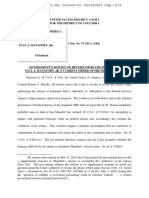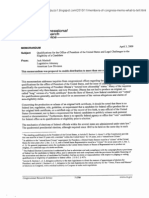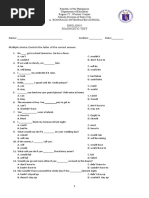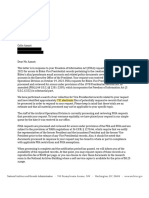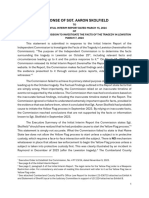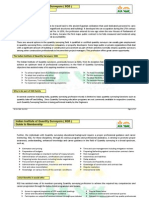Criminal Procedure Code - Search
Uploaded by
ebby1985Criminal Procedure Code - Search
Uploaded by
ebby1985SEARCH
INTRODUCTION (2) Search of Premises Search is another power given to police for the investigation of criminal offences. Search of Premises may be conducted with or without CPC only provides general provision aswarrant. regards to search. If a particular statute gives special power of search , that(a) Search w/out warrant may be conducted in specific provision overrides the CPC. circumstances provided u/s. 62 , 62A, 62B and 63. SEARCH UNDER CPC s. 62 Before a search is conducted under this Under CPC there are two types of search section, the following conditions must be fulfilled.
(i)information must be received by an inspector or above (1) Search of Persons arrested (ii)the information relates to a reasonable cause to suspect that any stolen property id concealed or lodged in private place (iii)that officer has good grounds for believing that by reason When a person is arrested, theof the delay in obtaining a search warrant the property is likely police officer making the arrest or whento be removed arrest is made by a private person, the (iv) a list of the property alleged to have been stolen shall be police officer to whom the private persondelivered or taken down in writing with a declaration stating that such property has been stolen and the informant has hands over the person arrested may good gr for believing that the property is deposited in that search his body and all articles other than place. necessary wearing apparel found upon him (v) then the said officer may search that place for that specific will be placed in safe custody. Any article property and he shall be accompany by the complainant or his believe to be evidence of crime may berepresentative to identify the stolen property.
SUMMONS TO PRODUCE DOCUMENT OR OTHER THINGS
EFFECT OF ILLEGAL SEARCH Kuruma v Regina The appellant was stopped by a police constable and his person serached. Reg 29 of the ESCAR of
Kenya, , allowed any police officer of or above Assistance Inspector to stop and search any individual. The question on appeal to PC was whether the evidence proving that the appelllant was in possession of the ammo had been illegally obtained and should not have been admitted.Lord Goddard CJ held that the test to be applied as whether the evidence is relevant to the matters in issue, if so, the evidence is admissible. The court is not concerned with how it was obtained.
s. 51
whenever any court or police officer making a police investigation considers that the production of any document or property is necessary or desirable for the purposes of any investigation, inquiry trial or other proceeding under this Code by or before such court of officer, such court may issue a summons or such officer a written order to the person in whose possession or power such property or document is believed to be requiring him to attend and produce it at the place and time stated in the summon or order. PP v Teoh Choon Teck OKT was charged with two accounts of
forgery .One with letter and the other with cheque. Defence council requested for the copies of documents seize by police. The learned magistrate granted. On appeal it was held that the objective of s. 51 is anything which may reasonably be regarded as forming part of the evidence in the case may be ordered to be produced . T/fore the PO is ordered to supply the documents as stated in the charge for Okt to prepare his defence.
Ghani & Ors v Jones
Lord Denning : If the search was conducted unlawfully and if any incriminating substance found ,the court should not allow it to be used. Furthermore the police is gui;ltyy of tresspass.
K v Queen
It was held that although the search is illegal but the court has discretion to admit or not the evidence.
S.20
PP v Seridaran
The Police has conducted investifgation w/ot OTI u/s. 108 (2) CPCIt was contended that such failure amount the render the eidence obtained in the investigation as illegal. But the court accepted it and approved Kuruma .
2. Evidence obtained through interception of communication. The principle under Kuruma still applies. Many specific statutes eg. s. 27 A DDA , s. 11 Kidnapping Act and Reg. 23 ESCAR. legalize it. 3. Illegally obtained evidence is admissible but the police are subject to civil action. SECTION 435 CPC power of police to seize property suspected of being stolen This section stipulates that any member of the police force may seize any property which is alleged or may be suspected to have been stolen, or which is found under circumstances which create suspicion that an offence has been committed , and such member, if subordinate to the officer in charge of the nearest police station, shall forthwith repot the seizure to such officer. (i) This section includes situations where police officer seize with or w/out warrant. (ii)to seize stolen property not mentioned in the WT (iii)allows to seize ,during search other incriminating item found . (iv) seizure can be conducted even investigation done base on CPC or other law. After seizure a search list must be issued.
detained till discharge or acquittal
any police officer my enter any place in of stolen property and search, seize and secure s. 21 - But if offensive weapons found,search any property which he believes to have been stolen .He the police officer or other person (including has to be authorized in writing Chief Police Officer to do private person) may take them away and the above deliver them to the court or officer. 63 (3) - CPO may give such authority under the s. 22 If a person is under lawful following cases or either of them custody but becox of incapacity frommonths has been in the occupation of or used by any person intoxication, illness, mental disorder orwho has been convicted of receiving stolen property or infancy is unable to give a reasonable harboring thieves. account of himself, he may be searched for (ii) when the place to be searched is in the occupation of or used by any person who has been convicted of an offence the purpose of ascertaining his name and involving fraud or dishonesty and punishable by place of abode. imprisonment. s. 19(2) -woman must be search by another woman with strict regard to63(2) in every case in which any property is seized , decency. the person in whose place it was at the time of seizure or the person from whom it was taken, be summoned s. 17 If a place is being searched allbefore a Magistrate to account for his possession of the person in it may be detained until search isproperty unless that person has been previously charged for receiving the same property knowingly it to have completed. But if the thing sought is in its nature been stolen. capable of being concealed upon theThe Magistrate shall make order of disposal of the person, that person can be searched for property and if necessary may award costs. the thing in the presence of a Magistrate, JP or a police not below Inspector. s. 62A Inspector and above may search premises s. 3(5) Police Act- justify search of without warrant for counterfeit coins or instrument or members of public at the road side on the material for the purpose of counterfeiting coins ground to prevent and detection of crime. s.62B- Inspector and above may w/out warrant search premises for forged or counterfeit currency or any machinery, instrument or material used or intended to be used for the forging or counterfeiting of any currency.
(i) when the place to be searched is or within the preceding 12
s. 63(1)
s. 51 is applicable to all documents in possession of any parties in the proceeding. Although Okt is entitle to inspect the documents from PO , but PO has no right to Photostat it for OKT. Note: Defence also can apply u/s.51. Hj Abd Ghani b. Ishak v PP approved the above decision and allowed
the defence to make copies of the documents applied for. Here OKT was charged for corruption and applied for several documents seized by BSN.
Syed Abu Bakar b. Ahmad v PP Seah J did not agree with the Hj Abd.
Ghani case. He said s. 51 must be applied strictly. If defence is allowed to have the copies of document it will hamper the PO case. Defence only entitle when it has beentendered in court .At that moment defence can asked for adjournment.
PP v Raymond Chia KimChwee & Anor Supreme Court of the veiwe
that , there 3 points to be considered while construing s. 51. (a) Stage of proceeding at which the application was made (b) relationship between s. 51 and s. 152 ,153 and 154 (c) right to have documents or thing u/s. 51 If the application under s. 51 is made prior to commencement of trial then the requirement of s. 152, 153 and 154 must be considered. The charge must have sufficient particular of the offence .If the stage is prior to commencement of trial, an application must be specify particular documents. If during the trial then the documents asked for must be relevant to the issues for adjudication. We can conlude that it is entirely on the discretion of the trial court having regard to the justice of the case.
Chic Fashions (West Wales) Ltd. v Jones
The police were authorized by a warrant to search a shop belonging to the P for goods stolen from Ian Peter Ltd.When they went to that shop, they searched the premises but did not find any of Ian Peter Ltd. goods but seized goods of other makes of thekinds which had been stolen and which thought were stolen.After explaination given by Plaintiff`s managing directors the goods were return to P. P then claim damage for tresspass. Lord Denning held that when a constable enter a premises under search warrant for stolen item, he may seize not only the goods which he reasonably believed to be covered by the warrant but also other item which he reasonably believe to be stolen.
Ghani & Ors v Jones
When a search of a missing woman w/out warrant was made in her father in-laws house. The police requested documents including passport of her father in-law, his wife and daughter and the occupants of the house. They later asked for the return of the passport and documents as they wished to visit to Pakistan. But the police refuse to return them. P brought an action the D a senior police officer for the mandatory order for delivery of passports and documents and injunction restraining their detention and damages. Held: Three points to be considered (a) The police had no search warrant therefore police must obtained the consent of the house owner to enter or by force. (b) Police kept the documents and passport w/out owners consent (c) no arrest of murder was made yet. Although commonlaw position is that no search were to be conducted in order to see if he had committed any crime. Yet sometime court allow such search for the interest of society . Lord denning gave 5 requised to be satified: (a) police must have reasonable ground to believe that a serious offence has been committed. (b) He has reasonable gr to believe that the documents are fruit of the crime, or instrument by which it is committed or is material evidence to prove the commissions of the crime.
Kulwant v PP it was held that an application can be made under the s. 51
to the trial copurt only after the recording of prosecution evidence has commenced. Huzir b. Hassan v KPD Johor Bahru - OKT applied for his uncautioned statement made during the police investigation u/s. 51. The KPD refuse becox of national interest. It was held that the uncautioned statements is not admissible in the trial as such it is justified.
s. 52- High Court Judge or Session Court Judge may require the
postal or telegraph authorities to deliver such postal article ,telegram or other article for the purpose of investigation, trial inquiry. Pending such order, DPP may require such officer to cause a search and detain such documents. The court may also issu search warrant u/s. 54 (1) (a)
(c)
s.64- search list must be prepared by officer ,stating all
things seized, the place found, and signed by officer.
s.65 Occupant
or someone on his behalf must be allowed to be present during search and copy search list be delivered to him
s. 116
That the person in possession it has himself committed the crime or is implicated t it, or is accessory to it or his refusal is unresonable. (d) He must not keep tha rticle nor prevent its removal for a longer period. (e) The lawfulness of the police conduct must be judges at that time and not afterwards. Base on these points, he ruled that the police is not entitled to hold the documents/passports. Under CPC the police officer who seized the items must refer it to the OCS and he will then refers the matters to the Magistrates u/s. 413 CPC. The magistrates than will make order on the said items.
provide search w/out warrant by police officer making investigation considers the productions of such documents relates to investigation is necessary, and if wait for a summon /order u/s. 51 will not produce as directed , such officer may search or cause search to be made for the same in any place
In Re Kah Wai Video (Ipoh) Sdn.Bhd.
An offence under Copyright Act. Acting on serach warrant some item which were not included in the warrant was seized. The Magistrate oreered to be returned to the owner. HC held that the magistrate who issued search warrant has not power to order the return of the siad article. T/fore it is illegal and void and of no effect. Eeven if the magistrate has power to do so, he should not do so there is an implied extension of the powers under warrant to siezed unsheduled articles.
SEARCH WARRANT (SS. 54 TO 61 CPC) S. 54 (1) - The court may issue a search warrant in the situations mentioned below: (a) where any court has reason to believe that a person to whom a summons u/s. 51 or a requisition u/s. 52 (1) has been or might have been addressed will not or would not produce the property or document as required by such requisition. (b) Where such property or document is not known to the court to be in the possession of any person or (c) Where the court considers that the purposes of justice or of any inquiry, trial or other proceeding under this Code will be served by a general search or inspection. s. 54(2) If the search is for postal article, telegram or other documents in the custody of the postal or telegraph authorities , then HC may grant search warrant. Section 54 covers search for the purpose of investigation. s. 56 allows a magistrate to issue a warrant, authorizing the person to whom it is directed to enter, with such assistance, as may be required and search the place for any evidence or thing. If anything found during the search it may be seized and brought before magistrate to dealt according to law. The magistrate only issue a warrant u/s. 56 if there is reasonble ground to believe upon information supplied to him to conduct any investigation of an offence. s. 58 - The magistrate can issue the search warrant if someone is wrongfully confined. If found the person, he must be brought to magistrate for further order. s. 61 Magistrate may direct search in his presence under which he is competent to issue search warrant. Search warrant ordinarily directed to CPO and to some other officers mentioned in it. A magistrate may also direct any other person other than police officer to execute. The court may specify in it the particular place for search. s. 57 search warrant must be in written form, signed and sealed. Every such warrant shall remain in force for a reasonable number of days mentioned in it. Lam Chik v PP HC Spore held that a period of 5 to 7 days after it was issued was held to be reasonable. What is reasonable depend on facts and circumstance of each case. Further to mentioned the days are on directory and not mandatory. s. 59(1) if the place suppose to be search is closed, person residing or in charge of it must give assistance. If not officer can break open the door/window as mentioned u/s. 16(2) s. 60- The magistrate who issue search warrant may attend in person while the search. s. 65 - The occupant of his rep shall be allowed to attend while search. s. 64 a search list of item seized prepared and signed and a copy of it must be delivered to occupants or any person at his request. San Soo Ha Failure to comply with the provision relating to serach list is that it may cast dopubt upon the bona fide of the parties conducting the serach and accordingly afford gr for scrutiny. But failure to prepare a search list by itself would not entitle the appellant to an acquittal. PP v Chin Hock Aun the seizure was conducted by polices in accordance with the provision of DDA. It was held that there is t/fore no legal obligation on the part of the raiding officer in this case to prepare and deliver a search list under the terms of s. 64 or 65. PP v Chew Yoo Choi Search list which containned OKT`s signature was consttrued as a confession. Since at that time OKT was under arrest, he must be given a caution. PP v Lee Soon Sian, Abd. Malik J held that the signature in the search list is only a kin of aknowledgement and not amount to confession. This was approved in Ahmad b Lateh & Anor. and also Wong Kim Leng.
You might also like
- Fibergigaband Internet Service Agreement: Residential Package InclusionsNo ratings yetFibergigaband Internet Service Agreement: Residential Package Inclusions1 page
- Innovation Zone Bill Draft - Update.1.31.2021100% (4)Innovation Zone Bill Draft - Update.1.31.202118 pages
- Government Motion On Paul Manafort Pretrial ReleaseNo ratings yetGovernment Motion On Paul Manafort Pretrial Release90 pages
- CRS-Congressional Internal Memo-What To Tell Your Constituents Regarding Obama Eligibility Questions100% (5)CRS-Congressional Internal Memo-What To Tell Your Constituents Regarding Obama Eligibility Questions14 pages
- A. Bonifacio Integrated School English 9 Diagnostic Test100% (5)A. Bonifacio Integrated School English 9 Diagnostic Test2 pages
- 2012-03-22 - FL - COLLETTE V Obama, Et Al. - Ballot ChallengeNo ratings yet2012-03-22 - FL - COLLETTE V Obama, Et Al. - Ballot Challenge8 pages
- Jack Smith Opposes Trump Discovery Motions J6 CaseNo ratings yetJack Smith Opposes Trump Discovery Motions J6 Case45 pages
- 7 18 18 US Motion For Pretrial Detention ButinaNo ratings yet7 18 18 US Motion For Pretrial Detention Butina29 pages
- Georgia Supreme Court Reinstates State Abortion Law While Appeal Is HeardNo ratings yetGeorgia Supreme Court Reinstates State Abortion Law While Appeal Is Heard7 pages
- 2023 07 17 JDJ To Wray Re Contempt - Voz MediaNo ratings yet2023 07 17 JDJ To Wray Re Contempt - Voz Media10 pages
- Failed Amendment Barring US Assistance To Ukrainian Neo-NazisNo ratings yetFailed Amendment Barring US Assistance To Ukrainian Neo-Nazis4 pages
- HPSCI FISA Reauthorization 2023 Report FINALNo ratings yetHPSCI FISA Reauthorization 2023 Report FINAL73 pages
- Ron Johnson Letter To FBI Director Christopher WrayNo ratings yetRon Johnson Letter To FBI Director Christopher Wray3 pages
- Marjorie Taylor Greene Initial DecisionNo ratings yetMarjorie Taylor Greene Initial Decision19 pages
- Real Estate Manager Brian Brodeur Responses100% (1)Real Estate Manager Brian Brodeur Responses2 pages
- Randall Greene Accused of FRAUD STEALING A HouseNo ratings yetRandall Greene Accused of FRAUD STEALING A House20 pages
- 66-1 - Letter From SCO To Sussmann Atty 3-30-22No ratings yet66-1 - Letter From SCO To Sussmann Atty 3-30-229 pages
- Cimb Bank BHD V. Anthony Lawrence Bourke & AnorNo ratings yetCimb Bank BHD V. Anthony Lawrence Bourke & Anor21 pages
- DOJ Memo On INS Warrants of Deportation in Relation To NCIC Wanted Person File (4/11/89)No ratings yetDOJ Memo On INS Warrants of Deportation in Relation To NCIC Wanted Person File (4/11/89)9 pages
- ANKENY V GOVERNOR OF THE STATE OF INDIANA - APPEALS COURT OPINION - 11120903100% (2)ANKENY V GOVERNOR OF THE STATE OF INDIANA - APPEALS COURT OPINION - 1112090319 pages
- Voeltz v. Obama - Final Opposition To Defendants Motion To Dismiss - Florida Electoral Challenge - 12/13/2012No ratings yetVoeltz v. Obama - Final Opposition To Defendants Motion To Dismiss - Florida Electoral Challenge - 12/13/201225 pages
- United States v. Frank James - ComplaintNo ratings yetUnited States v. Frank James - Complaint10 pages
- Special Counsel Responds To Hunter Biden's Arguments About FARA (Aug. 7, 2024)No ratings yetSpecial Counsel Responds To Hunter Biden's Arguments About FARA (Aug. 7, 2024)9 pages
- Some Violent Opportunists Probably Engaging in Organized ActivitiesNo ratings yetSome Violent Opportunists Probably Engaging in Organized Activities5 pages
- Response of Sgt. Aaron Skolfield To The Initial Interim Report 050724No ratings yetResponse of Sgt. Aaron Skolfield To The Initial Interim Report 05072420 pages
- 2024-06-03 CR AB TM To Garland Re Jan 6 InformationNo ratings yet2024-06-03 CR AB TM To Garland Re Jan 6 Information5 pages
- Billionaire Fundraiser Promised To Influence Trump Administration For ChinaNo ratings yetBillionaire Fundraiser Promised To Influence Trump Administration For China6 pages
- Kerchner & Laudenslager V Obama (As Amended) - Petition Objection Filed 17feb2012 Amended 24feb2012100% (1)Kerchner & Laudenslager V Obama (As Amended) - Petition Objection Filed 17feb2012 Amended 24feb201226 pages
- Rapport-Marco-Polo-Hunter-Famille-Biden (1) (1) - Pages-17No ratings yetRapport-Marco-Polo-Hunter-Famille-Biden (1) (1) - Pages-175 pages
- Oleg Deripaska Et Al Sept 29th IndictmentNo ratings yetOleg Deripaska Et Al Sept 29th Indictment31 pages
- Address by DR Tal Becker - 11 Jan 2024 - FinalNo ratings yetAddress by DR Tal Becker - 11 Jan 2024 - Final16 pages
- Impeachment: Donald Trump and the History of Presidents in PerilFrom EverandImpeachment: Donald Trump and the History of Presidents in PerilNo ratings yet
- Đề Cương Giữa Kỳ i Tiếng Anh 12 Văn LangNo ratings yetĐề Cương Giữa Kỳ i Tiếng Anh 12 Văn Lang21 pages
- Measuring Empowerment in Working Life: A Review: Work February 2006No ratings yetMeasuring Empowerment in Working Life: A Review: Work February 200611 pages
- Date Financial Assets Held For Trading: ILLUSTRATION 1: Initial MeasurementNo ratings yetDate Financial Assets Held For Trading: ILLUSTRATION 1: Initial Measurement2 pages
- Zero Conditional - Safety Rules WorksheetNo ratings yetZero Conditional - Safety Rules Worksheet3 pages
- The Mahavadanasutra A New Edition Based On Manuscripts Discovered in Northern Turkestan Sanskrit Worterbuch Beihefte Takamichi Fukita100% (2)The Mahavadanasutra A New Edition Based On Manuscripts Discovered in Northern Turkestan Sanskrit Worterbuch Beihefte Takamichi Fukita64 pages
- Critical Areas in Region 4A, PhilippinesNo ratings yetCritical Areas in Region 4A, Philippines3 pages
- Template for an authorization letter you can use to request financial assistance for hospitalization bills3No ratings yetTemplate for an authorization letter you can use to request financial assistance for hospitalization bills33 pages




